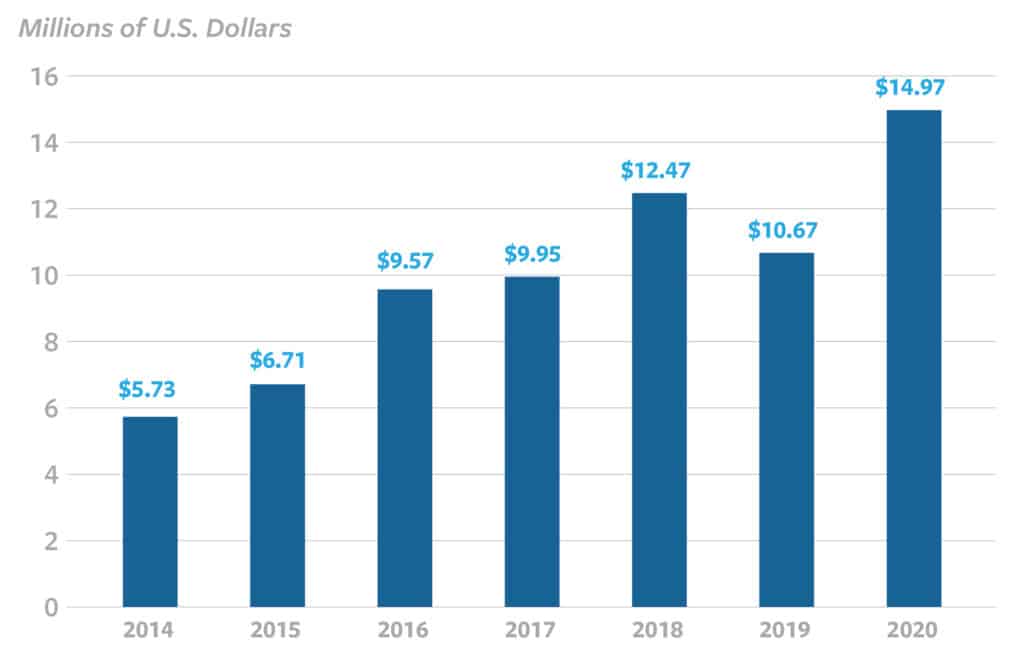July 22, 2021 | Policy Brief
UN Has Now Spent Over $70 Million at the Four Seasons Damascus
July 22, 2021 | Policy Brief
UN Has Now Spent Over $70 Million at the Four Seasons Damascus
Newly released procurement data show that UN agencies spent $14.9 million last year on housing and other services at the Four Seasons Damascus, with total spending of $70.1 million at the hotel since 2014. The Treasury Department sanctioned the hotel in 2019 because of its owner’s role in financing the regime of Bashar al-Assad. The continual awarding of UN contracts to regime-controlled entities demonstrates the extent to which the Syrian dictator has turned humanitarian assistance into a source of income for his cash-strapped government.
UN Spending at the Four Seasons Damascus
Source: Dashboard for Procurement Data by Supplier, Annual Statistical Report on UN Procurement. Figures include value of contracts awarded to Four Seasons Damascus and its parent holding company, Syrian Saudi Company for Touristic Investments. No contracts reported for these suppliers in 2011-2013.
The 2020 Annual Statistical Report on UN procurement indicates UN agencies purchased $244.5 million worth of goods and services in Syria last year, including the $14.9 million spent at the Four Seasons Damascus. The UN procurement website lists all suppliers who received contracts worth $30,000 or more. However, the website lists no supplier for 212 Syria-related contracts with a total value of $44.4 million, instead simply indicating that the supplier’s name was “withheld for security reasons” or “withheld for privacy reasons.”
UN procurement in Syria began to receive substantial attention in 2016 when an investigation by The Guardian found that individuals and entities close to Assad had received tens of millions of dollars’ worth of contracts, including $9.3 million for the Four Seasons Damascus. When questioned, the United Nations said the hotel was the safest place for UN personnel to stay in Syria’s war-torn capital. Yet even after the front lines shifted to provinces far from Damascus, UN personnel remained at the Four Seasons. According to physician and public health scholar Annie Sparrow, the Assad regime compelled the United Nations to put up its staff at the hotel, which is partly owned by Syria’s Ministry of Tourism.
In a book published earlier this month, former UN diplomat Carsten Wieland recounts how the United Nations initiated an effort to reform its Syria aid operations after both The Guardian and multiple human rights organizations documented Assad’s systematic expropriation of humanitarian assistance. That effort led the United Nations to issue a document called “Parameters and Principles of UN Assistance in Syria” and to establish a monitoring group charged with ensuring its implementation. However, the monitoring group has not convened even once, which Wieland attributes to Secretary-General Antonio Guterres’ reluctance to antagonize either Assad’s Russian patrons or the UN field agencies resentful about being criticized.
Since donations from the United States and its allies are the principal source of funding for UN aid, Assad is effectively shoring up his finances with U.S. and European taxpayer dollars. Moreover, this diversion of aid undermines the effectiveness of U.S. and EU sanctions intended to reduce the regime’s ability to fund its war effort, which entails deliberate atrocities against civilians.
During its first months in office, the Biden administration has moved to renew U.S. engagement with the United Nations and other multilateral organizations, on the premise that reform has far better prospects when Washington has a seat at the table. On that front, the secretary of state and U.S. ambassador to the United Nations should press Guterres to convene the dormant monitoring group and direct all UN agencies to ensure their operations in Syria conform to the new parameters document.
The secretary of state and UN ambassador should also establish a consortium of leading UN donors to press jointly for the reform of UN aid to Syria. Changes should include greater transparency about contract recipients whose names are currently withheld for alleged reasons of privacy or security. Finally, Congress should consider making U.S. financial support for that aid contingent on swift UN reforms. Initiating the legislative process now would strengthen the Biden administration’s hand as it presses the United Nations to change.
David Adesnik is research director and a senior fellow at the Foundation for Defense of Democracies (FDD), where he contributes to FDD’s Center on Economic and Financial Power (CEFP). For more analysis from David and CEFP, please subscribe HERE. Follow David on Twitter @adesnik. Follow FDD on Twitter @FDD and @FDD_CEFP. FDD is a Washington, DC-based, nonpartisan research institute focusing on national security and foreign policy.
